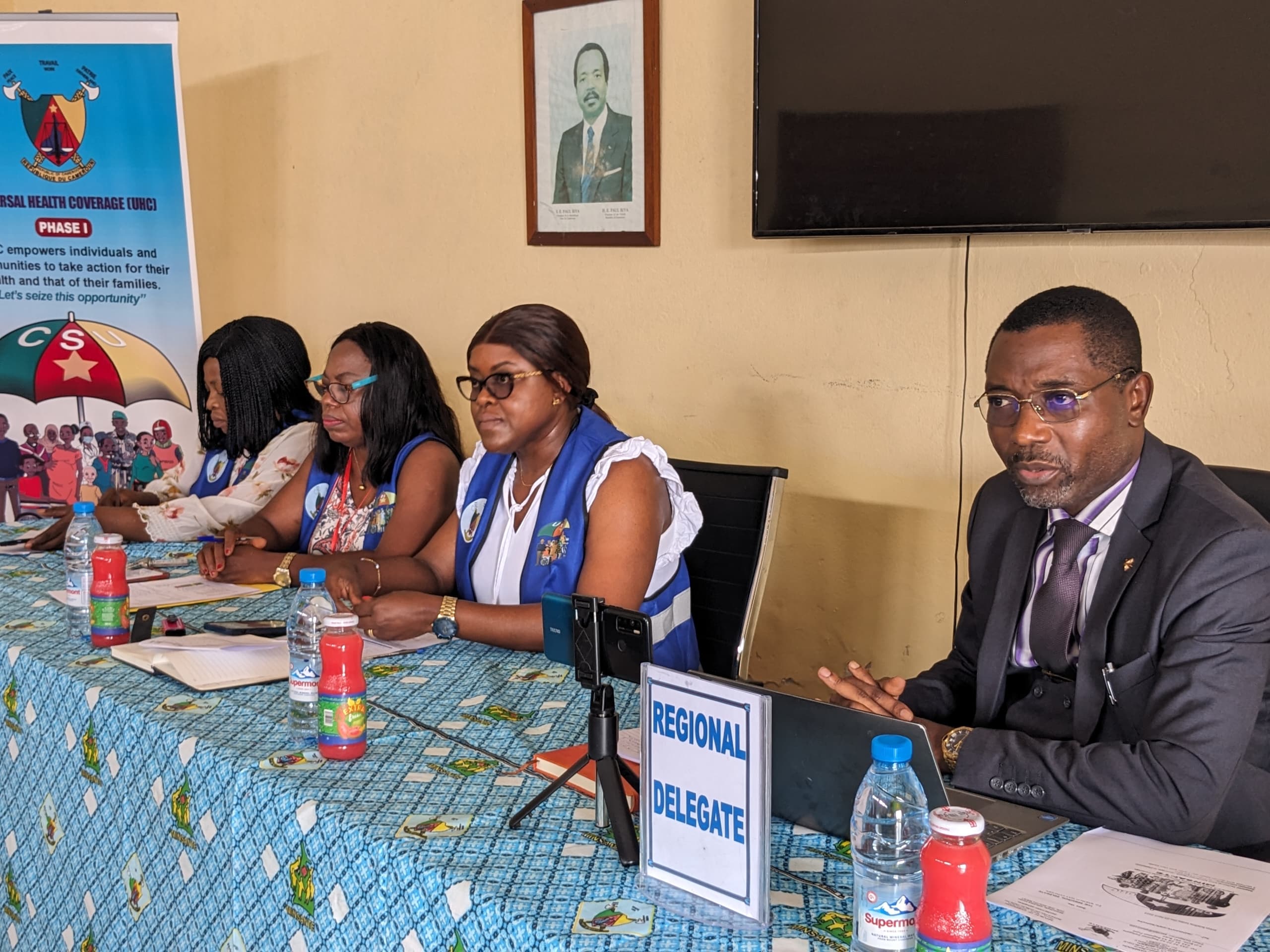Southwest RDPH (far right), Dr Filbert Eko Eko, presiding over UHC Phase I evaluation meeting in Buea on April 23, 2024
By Hope Nda
Health officials in the Southwest Region have enrolled 166,410 people, notably pregnant women, HIV, TB and kidney disease patients, into the Universal Health Coverage (UHC) programme, one year after its first phase kicked off in Cameroon.
The Regional Delegate for Public Health, Dr Filbert Eko Eko, said the number of enrollments accounts for 40 percent of the target population and it takes the Region very close to the 60 percent mark set by the government for 2025.
The delegate chaired an evaluation meeting in Buea on Tuesday, April 23, to take stock of the road covered so far in the implementation of the UHC scheme.
At the meeting, he urged the population to embrace the programme, whose general objective is to improve access and use of healthcare services.
Dr Eko Eko said the UHC is already staining its goal of uplifting financial barriers to healthcare, which is the first hindrance to healthcare for the Cameroonian population.
The programme’s first phase, launched by the Minister of Public Health, Dr Manaouda Malachie, on April 12, 2023, has been providing free consultation and Malaria treatment to pregnant women and children aged zero to five years; free hemodialysis services and free treatment for HIV and TB patients.
In a presentation at the meeting in Buea, the Coordinator of the Malaria programme for the Southwest, Dr Itoe Bissong, said at least 75,000 children have been treated of Malaria in the Region thanks to the UHC programme.
The disease, Dr Bissong noted, remains a heavy burden in the Southwest and in the nation as a whole, with one out of every five hospital consultations testing positive for Malaria.
The UHC programme nevertheless is bridging the gap between healthcare services and the beneficiaries. The expert noted that they have distributed 80,000 doses of Malaria medication free of charge and 26,000 treated mosquito nets to children and pregnant women in the Southwest in the past one year.
These free consultations were recorded at government integrated health centers, Subdivisional hospitals and district hospitals.
“Children zero to five are consulted free of charge. And if they are suspected of malaria, the diagnosis is free. If they are diagnosed of malaria, the treatment is free,” Dr Filbert Eko said.
Meanwhile, the UHC programme has also uplifted the financial burden of over 1,000 kidney disease patients living in the Southwest Region by providing free hemodialysis.
Patients only need to pay a “social contribution fee” of just FCFA 15,000 at a dialysis centre and proceed to obtain free dialysis every year.
Before the coming of the UHC, kidney disease patients spent between FCFA 450,000 to 500,000 yearly for hemodialysis, Dr Filbert Eko Eko said.
“My first message to the public is that Universal Health Coverage Phase One is a reality. Many persons are benefitting. Don’t be Thomas. But if you want to be Thomas it is very good that you can try it. Do your enrollment; go to any of our facilities…,” said the Regional Delegate added.
The UHC has come with a huge financial impact on the government. In the Southwest Region, Universal Health Coverage services amounted to FCFA 75 million by December 2023, that is, eight months after the programme was launched.
The Southwest Regional Fund for Health Promotion, headed by Madam Ngondo Wendy, is in charge of evaluating and certifying the financial claims made by hospitals that render free services under the UHC.
- Wendy revealed that free hemodialysis services alone incurred the government FCFA 24 million; HIV and TB services FCFA 36 million and free consultation for children FCFA 12 million as of December 2023.
Despite the successes recorded, the Universal Health Coverage scheme is constrained by some challenges, notably including insecurity in parts of the Southwest Region.
This owes to the ongoing armed conflict that has prevailed in the English-speaking Regions since 2017.
Dr Filbert Eko said health workers are navigating daily huddles to deliver care even to the most enclave areas in the Region.
“We think that we are doing a lot. The socio-political security challenges that we have are impeding most of our activities in certain areas but we are developing mitigating factors, circumstances and situations to see how to achieve and, of course, to attain the targets before 2025,” the regional health Delegate said.

